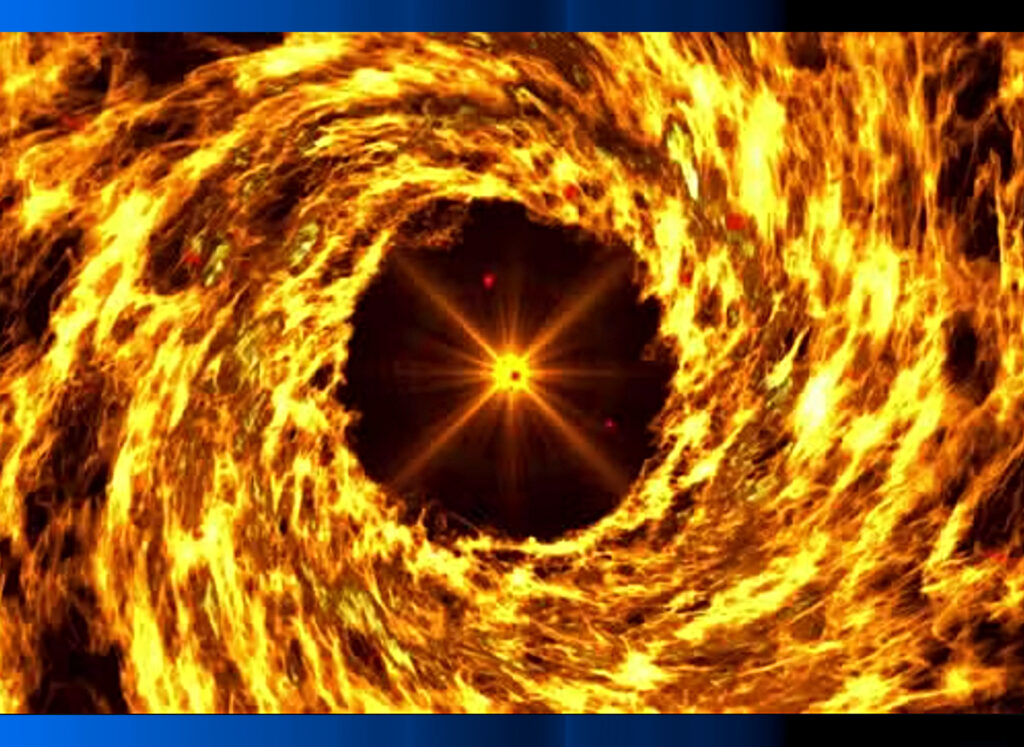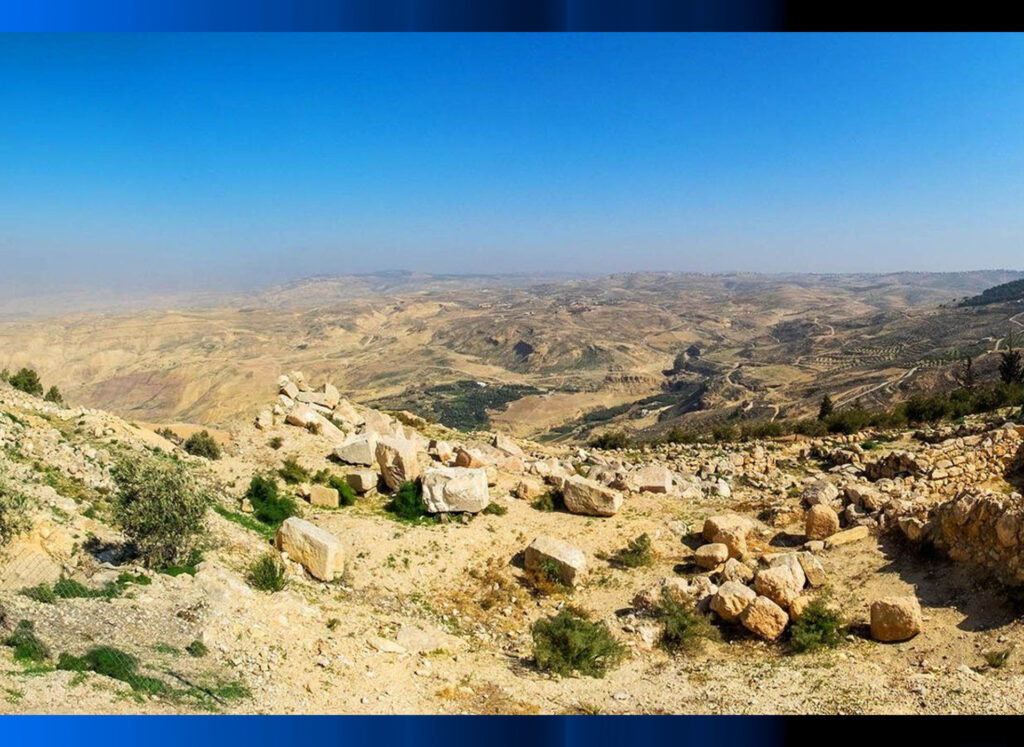An Inspirational Story for Simchat Torah
Ben Kerido
He was one hundred and twenty years old to the day; his eyes remained sharp and his strength and vigor were unabated . His hair was white and thin, and his long, flowing beard fluttered in the cool, dry breeze that rushed between the wadis and danced on the mountains in the steppes of Moav (Moab).
He sat on a large rug at the entrance of his tent. A large scroll rested on the table in front of him. With painstaking care and solemnity, he gently penned the last letters of the scroll.
It was finally complete.
A pillar of smoke and fire appeared above a nearby tent-like structure. The cloud mystically erupted with flashes of thunder and booming of lightning.
A small, still Voice – indeed, a whisper that bellowed beyond comprehension – called to him from the pillar of cloud and fire above the Mishkan (Tabernacle).

“Moshe,” the Voice addressed the greatest prophet of the Jewish people, as if beckoning to an old friend. “Moshe.”
“Hineni, Here I am.”
“The time has come,” the Voice responded. “It is time for you to die.”
The statement was made somberly, yet not with harshness; sensitively, yet not with the tone of tragedy that one would expect from a human source.
Moshe Rabbeinu (Moses our Teacher) rolled up the heavy scroll and carried it gingerly and lovingly himself, despite his age. He lifted his undimmed eyes. Over six hundred thousand men and their wives and children – millions in total – surrounded the Mishkan. His protege, Yehoshuah Ben Nun (Joshua, son of Nun), along with the Kohanim and Levi’im (the priests and attendants), stood at the entrance of the large tent of worship.
An ominous, deafening silence pervaded the swarm of the descendants of Yisrael (Israel) encircling the Mishkan. Moshe Rabbeinu solemnly yet steadily approached Elazar and Pinchas, supreme Kohanim (priests) of the early Jewish people.
“This is the completed Torah. Place it beside the Aharon HaBrit (the Ark of the Covenant) in the Kadosh HaKadoshim (the Holy of Holies). At the time of Sukkot (the Feast of Booths), when all of Yisrael has come to the place that the Most High shall select, you shall read this Torah to all of the people – men, women, children, and foreigners who dwell among you. They shall all learn, fear the Almighty, and observe the mitzvot – the laws, the statutes, and the commandments – of this Torah, in the land across the Yarden (the Jordan River).”
Moshe Rabbeinu gently handed the scroll to Elazar and Pinchas, who both kissed it respectfully.
“See?” Moshe addressed the people with a loud voice unhindered by his one hundred and twenty years of age. “I have set before you life and death, prosperity and adversity, a blessing and a curse. I command you this day,” the prophet declared passionately and with an indescribable spiritual vigor, “to love the Almighty with all of your heart, soul, and might. I implore you to keep His commandments, and thereby you shall live and prosper in the land promised to your fathers, Avraham, Yitzchak, and Yaakov (Abraham, Isaac, and Jacob). This is no trivial matter. Choose the Torah. Choose life!”
Moshe Rabbeinu stared for a long, quiet moment at the crowd surrounding him. His eyes were filled with both love but also with frustration – even fury. Moshe knew that already there were those present who watched the prophet with mock tears while they secretly waited for him to die. They gleefully longed for the opportunity to turn to avodah zarah (idolatry) and rebel against both the Most High and the teachings that the prophet presented to them. Indeed, even now the Almighty was telling Moshe as much from the cloud above the Mishkan.
The pillar of smoke and fire surged with thunder and lightning. Moshe Rabbeinu stood before the people and closed his eyes for a long, intense moment. He inhaled and exhaled deeply several times. And then Moshe Rabbeinu opened his mouth. His voice emanated in a melodic, haunting tone as he sang the words of a poem of warning.
“Ha’azinu… Listen, O heavens, and I will speak; hear, O earth, the words of my mouth! The Rock! His deeds are perfect; He is faithful and never false…”
Moshe Rabbeinu’s body swayed as he sang the poem. The power of his words reverberated throughout the camp of Yisrael with vibrant, spiritual intensity.
“Our Rock has declared, ‘See, now, that I, that I am He. There is no false god beside Me! I deal death and give life; I wound and I heal. And there is none who can deliver from My hand’…”
As Moshe concluded the poem, the Most High once again called to the prophet from the pillar of cloud resting above the Mishkan.
“Ascend to Har Nevo (Mount Nebo),” the Voice whispered. “There you shall view the land that I am giving to the descendants of Yisrael. And there you shall die.”
Moshe Rabbeinu exhaled with strength and resolve. His elderly form passed by each tribe as they clamored around them. Men, women, and children thronged him from every side. He blessed them all as he passed by and bid them farewell.
“Hear, O Most High, the voice of Yehudah (Judah); assist him against his foes!… Bless, O Almighty, the substance of Levi!… They shall teach Your Torah to Yisrael!… Blessed of the Divine Presence of the Bush is the land of Yosef (Joseph), with the bounty of the dew, of the deep, of the hills!… Dan is a lion’s cub that leaps forth from Bashan!… How happy are you, O Yisrael! Who is like you, a people delivered by the Most High, your protecting Shield and your triumphant Sword!”
Moshe Rabbeinu finally broke away from the congregation of Yisrael. He had said goodbye to every member of the congregation, except for one. A certain individual much younger than the prophet stood between Moshe Rabbeinu and the nearby mountains of Moav. Two streams of desperate tears silently poured from his face, in stark contrast to the image of strength portrayed by his armor and weapons of war.
“Yehoshuah,” Moshe said gently. He stepped towards his faithful attendant and protege of the last forty years and pulled him close. Moshe wrapped his arms around the younger warrior in a strong embrace despite his age. Yehoshuah Ben Nun now sobbed and convulsed in the arms of his mentor.
“Be strong and of good courage,” Moshe first whispered, and then raised the volume of his voice to address the people nearby as well. “I shall not enter the land, because the Most High was angry with me on account of this congregation, when I struck the rock instead of speaking to it. I shall not cross the Yarden, but you, Yehoshuah, will bring the people into the land that the Almighty swore to their fathers to give them.”
Yehoshuah said nothing out loud, but his face futilely begged Moshe Rabbeinu to remain with him. After forty years of Moshe Rabbeinu’s leadership, how could he ever take on such a monumental task alone?
“The Most High will be with you,” Moshe insisted. “He will never fail you nor forsake you. Do not be afraid, and do not be dismayed!”
Yehoshuah still continued to weep, tightly gripping Moshe. Nevertheless, he breathed deeply and resolutely stood up straighter.
Moshe Rabbeinu spoke more soothing words of comfort and encouragement to his protege, softly kissing him on each cheek. Eventually, the prophet pulled away from Yehoshuah’s embrace.
Moshe turned towards the heights of Abarim, and steadily proceeded towards the summit of the nearby mountains. The congregation of Yisrael remained behind in cold silence, trying to process the ramifications of the event unfolding before them. Moshe methodically ascended toward the peak of Har Nevo, pulling himself upward among the loose desert rocks. Juniper, cypress, and acacia trees flanked him on each side with a refreshing scent as he climbed ever upwards.

Finally, Moshe Rabbeinu reached the top of Har Nevo at the summit of Pisgah. He looked back towards the camp of Yisrael; their tents rested in order by their tribes situated around the Mishkan. Finally, emotion overcame the prophet.
He should have entered Eretz Yisrael (the land of Israel) within a few mere months of their departure from Mitzrayim (Egypt) about forty years prior. How much had these people complained, whined, and even rebelled! How many times did they test and try the Almighty, such as at Maasah and Meribah? How many times did he beg and plead for mercy from the Most High, Who might have destroyed the people in a single instant if Moshe Rabbeinu hadn’t intervened? And then – in the end – Moshe Rabbeinu himself could not even enter the land promised to Avraham, Yitzchak, and Yaakov. And if this is what the early nation of Yisrael did under Moshe’s careful supervision, what would they do now that he was gone?
Moshe Rabbeinu choked out a sob.
Forty years! And for what? What had he really accomplished? Was it all for nothing? He had failed!
Moshe buckled down in grief, collapsing to a fetal position on the top of the mountain. He trembled and convulsed with bitter weeping.
The cloud above the Mishkan shifted to rest above Har Nevo. Fire, lightning, and thunder swirled around the prophet in a whirlwind.
“Moshe,” the deafening Whisper called out from the circling whirlwind of cloud and fire. “I will show you the land.”
Moshe Rabbeinu wearily raised himself up somewhat and feebly crawled to the summit overlooking Eretz Yisrael. The weather was exceptionally clear. Moshe gazed all the way to the Mediterranean Sea; his eyes graced upon the hills of Yehudah; his sight took in the mountains of Ephraim and Menashe and the Kinneret lake; his vision reached the corners of the Negev desert.
The spiritual dimensions of navuah (prophecy) surged to the forefront of his view. Spiritual and prophetic apparitions blended with the physical sights before him. Moshe Rabbeinu’s pupils widened and his eyes flickered as he watched the future unfold before him:
The congregation of Yisrael crossed the Yarden…
The walls of Yericho (Jericho) fell as Yehoshuah Ben Nun and Yisrael surrounded the city and began the conquest of Eretz Yisrael…
One shophet (ruling judge) after another arose, defeating the oppressors of Yisrael after a period of punishment resulting from avodah zarah and rejection of the Most High and His Torah…
A king from Benyamin (Benjamin) to rule over the tribes of Yisrael…
A teenager slew a mighty giant with nothing more than a sling, and a new king rose out of Yehudah…
The son of that king built the Beit HaMikdash (the Holy Temple), a permanent “House” for the Most High in Yerushalayim (Jerusalem)…
The tribes of Yisrael split into two kingdoms, both plagued by avodah zarah and grievous sin…
The tribes refused to abandon their evil ways despite the pleading of the prophets…
Each kingdom was destroyed by ruthless, invading empires and the survivors were exiled…
The exiles who remained faithful to the Almighty returned to Eretz Yisrael and rebuilt the Beit HaMikdash…
A great enemy in a far away land rose up to destroy all of the Jewish people, but the Almighty – as hidden as He may have been – saved His people through a courageous queen…
A vile and arrogant man violated and profaned the Beit HaMikdash, until a righteous man and his sons led a revolt that hammered the evil out of Eretz Yisrael…
Corruption within the ruling priesthood surrendered Jewish sovereignty to a great foreign empire…
That empire cruelly dominated the world and destroyed Yerushalayim and the Beit HaMikdash while the residents of Eretz Yisrael died amidst shameful and reckless sinat chinam (baseless hatred)…
The Jewish people were exiled once again, now to all corners of the globe and far, far away from their homeland…
One invader and oppressor after another ravaged and pillaged Eretz Yisrael and the small population of Jews that remained in the land. Some carried shields brandishing crosses; others flew banners with fluttering crescents and moons.
The dark, ominous shadow of a powerful and wicked nation swooped like an eagle over an entire continent, extinguishing the souls of more than six million Jews in a flurry of ash, smoke, and fire.
And finally – thousands of years in the future – the Jewish people returned to the land promised to their fathers, Avraham, Yitzchak, and Yaakov…
A hopeless victory was won; a desolate wasteland was rebuilt…
And millions of Jews of all shapes, sizes, and colors from all over the world gathered together throughout Eretz Yisrael as a scroll was lifted before them. The men raised up their hands, pointing fingers wrapped in tzitzit (fringes), while the women clutched Hebrew siddurim (prayer books). Together they chanted in unison,
“V’zot haTorah… This is the Torah that Moshe set before the descendants of Yisrael, the words of the Most High through the hand of Moshe.”
Countless generations into the future, scrolls of the Torah were passed out on the final day of Sukkot, and the Jewish people danced with them!
Moshe Rabbeinu’s mouth opened and he gasped. A single tear slid down his cheek.
No. It hadn’t been for nothing.
And further in the distant future, the vision was much more hazy. Moshe Rabbeinu perceived a time when the Jewish people no longer rebelled against the Most High or failed in their observance of the Torah, when all of their intended oppressors were defeated, when the entire world coexisted in harmony under the leadership and spiritual guidance of an individual merely known as Moshiach.
The prophetic visions ceased and Moshe’s eyes readjusted. Now he could only see the land before him in its physical state, with all of the spiritual potential yet to be discovered and experienced for millennia to come.
For the first time in one hundred and twenty years, Moshe Rabbeinu began to falter as his life force began to dwindle. The prophet collapsed to his knees, coughing and struggling to breathe. Gazing about him, Moshe spied the entrance to a small, dark cave. With his remaining strength, Moshe crawled through the dusty rocks and shrubs towards the entrance. His bitterness and feelings of futility had all completely vanished as he pulled himself into the narrow darkness. He lay down on his back, facing upward, breathing heavily.
The whirlwind of cloud and fire continued to revolve around Moshe Rabbeinu, even more intensely than before. A great wind shattered and cracked the rocks nearby. The letters of the Torah – black fire emblazoned on white fire – swirled about him, intermingling with the very fabric of the universe.
Moshe’s breathing became intense and rapid, gasping even. Moshe’s face glowed brightly, illuminating the small cave. He reached his elderly, wrinkled hand outward, feebly and trembling, as his neshamah (soul) ignited and prepared to connect with the Most High in the celestial dimensions of the afterlife. With the last remaining bit of physical strength he possessed, Moshe Rabbeinu shouted in a voice that resembled a song rather than a scream,
“The Almighty! The Almighty! Merciful and gracious! Slow to anger! Abounding in kindness and faithfulness!”
The soft, still, murmuring Voice called to Moshe Rabbeinu one last time.
“Ekiyeh Asher Ekiyeh, I Will Be That Which I Will Be.”
The whirlwind twisted intensely above the cave with an indescribable fire and wind followed by an earthquake. Loose rocks and stones slid from above the cave and covered the entrance with several layers of earth. Moshe Rabbeinu’s arm dropped to his side and his jaws snapped shut.
The hand that split the sea through the power of the Eternal One would never rise again.
The mouth that spoke the words of the Creator of the universe would never open again.
But the effects of those miraculous actions would, in fact, ripple endlessly.
And the vitality of those words would, in fact, live forever.

